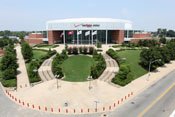Wednesday, November 24, 2010
It's become a rite of passage: The rebounding city builds a sports-and-entertainment arena, a shiny mark of maturity and status, like a 16-year-old's new car.
Birmingham, Baton Rouge, Memphis and Little Rock, Ark., have all built arenas, and a contingent of business leaders in Jackson have pledged their support for one here.
A steering committee of supporters for a downtown arena hosted a presentation Nov. 16 at the Jackson Convention Complex.
The dominant message at the event was that Jackson can support an arena—even that it deserved one.
"The fact of the matter is that this has been done all over the country," Jackson Chamber of Commerce President Jonathan Lee said. "And while it may be true that the early bird gets the worm, it's also true that the second mouse gets the cheese."
Downtown Jackson Partners President Ben Allen said that the luster has worn off the 48-year-old Mississippi Coliseum, which can accommodate up to 10,000 people.
The arena push in Jackson takes its inspiration from North Little Rock's 18,000-seat Verizon Arena. The arena's general manager, Michael Marion, said that he believed Jackson needed a major entertainment venue.
"You should be getting the same shows that we are," he said. "I believe that this area needs a new building, a big building."
Speaking to the Jackson Free Press later, Lee said that the appeal of an arena is ultimately economic, not aesthetic or cultural. "It's a proven economic generator," Lee said. "That's why we should have one. I like a good concert as much as the next guy, but it's an opportunity for us to create foot traffic in our town."
While North Little Rock's arena itself is not a "cash cow" for the city and county, it provides economic benefits in sales taxes and increased revenue for surrounding businesses, Marion said. It pays roughly $1 million in property taxes per year and maintains 22 full-time employees. The arena typically hosts around 120 events per year, with roughly 20 being the major concerts that account for the bulk of the arena's income.
Marion said that the arena's management did not have any estimates of the facility's overall economic impact. Neither the North Little Rock Visitors Bureau nor the Little Rock Convention & Visitors Bureau has completed comprehensive studies of the arena's impact.
The economic benefits of an arena vary from by city, according to a June 2010 study by the University of California-Davis' MBA Consulting Center. The center assembled case studies of arenas in other cities for the city of Sacramento, which is eyeing a new sports and entertainment arena in its downtown. Previous academic research has shown that arenas tend to displace economic activity from other parts of a city and sometimes cannibalize revenue that would go to surrounding businesses with their own concession stands.
"This does not discount the possibility that new synergies between an (arena) and existing assets can potentially increase the visitor base above that of former levels. It is this concept that provides much of the potential value to Downtown Sacramento," the study's authors found.
Marion cautioned in his presentation that Verizon Arena has only been profitable in six of its 10 years of operation. In 2000, 2001, 2005 and 2008, the arena lost money, and it is projecting a small loss this year.
The arena was a publicly supported project, which supporters marketed as part of a larger "river project," spanning both sides of the Arkansas River and including a $20 million expansion of Little Rock's convention center. The arena cost $82 million to complete, with $20 million coming in private sector contributions and $20 million pledged by the Arkansas state Legislature.
The bulk of the cost, $52 million, came from a one-year, 1-cent tax increase Pulaski County voters approved in a referendum.
Allen said that he expects Jackson's arena to cost more than the Little Rock facility but that cost is not the main concern.
"What something costs is irrelevant," Allen said. "It's relative to the wealth it creates. Do people complain about how much Trustmark Park (in Pearl) cost today? No."
In July 2009, the steering committee selected Populous Sports, a design and consulting firm specializing in sports venues, to handle the feasibility study.
Allen emphasized that the steering committee has made its activities as transparent as possible, posting detailed timeline and fundraising data on its website. The committee's original request for proposals, Populous' winning proposal and the committee's contract with Populous are all available for download on the website.
By Nov. 19, the committee had raised more than $60,000 of its $80,000 goal. With that target, Lee is optimistic that the Central Mississippi Planning and Development District will provide a matching $80,000 grant to fund the full cost of the study.
The study's second phase, which would end by mid-March, would assess possible locations and develop financing possibilities.

Comments
Use the comment form below to begin a discussion about this content.
Sign in to comment
Or login with:
OpenID